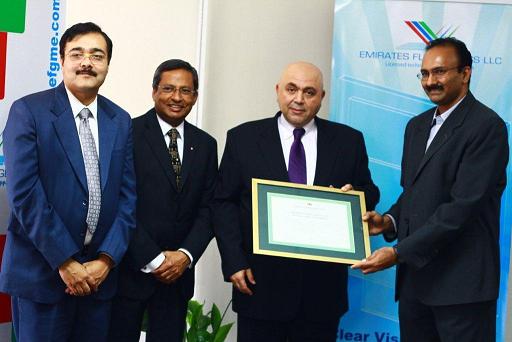
Emirates Float Glass reveals Carbon Management Program
At a press conference held on 14th May 2012, Emirates Float Glass (EFG) unveiled Carbon Management Program, directed at the reduction of their overall carbon foot print. The first step in the program is the benchmarking of their world class manufacturing facilities spread over 320,000 Sq.Mts in the Industrial City of Abu Dhabi (ICAD-2), UAE. The benchmarking has demonstrated that the glass manufactured in the facility has a CO2 emission of 553 gm CO2 / Kg of Glass, which is one of the lowest emissions for glass manufacturing in the world. This study was based on Greenhouse Gas Protocol, a Corporate Accounting and Reporting Standard from World Resource Institute (WRI) and World Business Council for Sustainable Development (WBCSD). Green Technologies has been appointed by Emirates Float Glass as Sustainability Consultant to complete the analysis.
In reducing Emirates Float Glass (EFG) overall carbon footprint, EFG has established their raw material Extraction and Manufacturing facilities in the Middle East, to serve the Middle East market. The environmental benefits of this objective is quantified as per the U. S. Green Building Council’s LEED Rating System for New Construction, addressing the Regional procurement of materials within a 800 km radius of the project site.
In this regard, projects which are in United Arab Emirates, Oman, and Saudi Arabia which are within 800 km from the EFG manufacturing facility in Abu Dhabi, are able to qualify and contribute for LEED points under Materials Credit MRc5: Regional Materials, as float glass produced by EFG are having 59% to 67% regional content for the projects, thus contributes to the achievement of points under MRc5.
Additional efforts by EFG to reduce their carbon footprint have resulted in the use of recycled materials in the production of the float glass, and thus contributes to LEED Materials Credit MRc4: Recycled Content. Float Glass produced by EFG contains 6.20% post consumer recycled content.
“Moreover, these efforts also resulted to minimizing the negative impacts toward the environment through reduction of manufacturing waste, energy conservation, and more significantly its environmental contribution to mitigate the effects of climate change”, said Ghassan Mashal , General Manger of EFG. These endeavors demonstrate EFG’s commitment to Sustainability and define its determination to make a positive contribution in its own way by setting an example of how companies can do their share in making a difference to our world.
In the concluding statement, Joy Mathews – Director of Engineering Projects at EFG elaborated efforts of EFG in reducing the carbon footprint of the glass they produce, contributing to a more Sustainable Built Environment.

